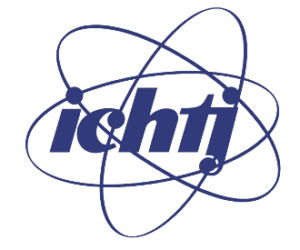Institute of Chemistry and Nuclear Technology
The Institute of Chemistry and Nuclear Technology (IChTJ) is the other partner institution behind the Graduate School. ICHTJ has been running a doctoral program in Chemistry since 1994. During the last 30 year more than 110 persons have been admitted to the Doctoral Studies. ICHTJ has category A. The research staff includes 10 full (state) Professors, 15 holders of the “Dr hab.” post-doctoral degree (with professorial appointments), as well as 26 PhDs. Currently over 10 PhD students are working on their thesis. The field of activity covers basic research in the field of radio – , radiation – and nuclear chemistry and radiobiology. Applied research refers to nuclear chemical engineering, radiation technologies, nuclear analytical methods, food irradiation and control, NDT and tracer industrial installations testing. ICHTJ has received authorization from the PAA President granted to scientific and research units that will support the Polish Atomic Energy Agency in the licensing and inspection of nuclear power plants. INCT prepared basic engineering for TRISO fuel manufacturing plant in the frame of Gospostrateg-HTR (held commonly with the Ministry of Climate and NCBJ) and with the Silesian Technical University (STU) and the company “Energoprojekt Katowice” within the frame of Gospostrateg-DeSire project which prepared complex evaluation of domestic power industry decarbonization plan by means of retrofit of coal plants with the use of generation III/III+ and IV nuclear reactors. In the frame of EU project TeaM Cables which was led by EdF was working on the techniques providing NPP operators with a novel methodology for efficient and reliable NPP cable ageing management. Institute is a represantive of Poland in the EURAD European Joint Programme on Radioactive Waste Management. INCT is a pioneer in application of membrane methods for medium and low level liquid radioactive waste and installation build and modified on the base of ICHTJ design has been in operation for more than 20 years at Radioative Waste Treatment Company (ZUOP), The Centre of Radiobiology and Biological Dosimetry (CRDB) conducts research in radiobiology, biodosimetry and nanotoxicology. These are interdisciplinary research at the intersection of biology, chemistry, radiation protection and medicine. The Centre operates the Radiobiological Dosimetry Laboratory, the only laboratory in Poland accredited in the field. Institute since more than quarter of century has been winning bids for the hydrological protective barriers at PGE Bełchatów mine and have constructed several pollution control installations in Poland and some abroad e.g. at ARAMCO Co SA, Jaddah. ICHTJ’s methods of NDT testing have been applied in power and oi sectors. The EBFGT plant constructed at PGE Dolna Odra Power Group was the biggest ever built facility using electron accelerators of the total +1.2 MW power.
The Institute has established unique complex of six electron accelerators “Rapid”which is a unit the Polish Roadmap for Research Infrastructure and serves as an IAEA Collaborating Center (the only one established in Poland among 7 nominated in the field all over the world). It operates the country’s only radiation sterilization facility for medical equipment and allogeneic transplants. At last ranking developments obtained by CC were granted 120 points (regular maximum was 100). nICHTJ is a coordinator and Designated Team Member of regional IAEA project RER 1023: Harmonizing Implementation of Radiotracer and Sealed Sources Techniques for Efficient Use of Natural Resources and Environmental Monitoring.
ICHTJ is an editor of NUKLEONIKA publishing works from the field of nuclear chemistry, nuclear physics, nuclear energy, radiobiology journal possessing IF and Journal Progress in Nuclear Technique.
ICHTJ is currently hosting 4 projects funded under Horizon 2020, 9 projects under National Science Centre (NCN), 4 under The National Centre for Research and Development (NCBiR) and 10 Coordinated Research Projects (financed by the International Atomic Energy Agency)
The study program in chemistry is a 4-year period of research and education through specialized lectures, seminars and practical exercises at domestic and foreign research centers. The lectures cover both basic issues of chemistry and chemical aspects of atomic science, both theoretical basis and applications in energy, industry, medicine and environmental protection. Doctoral theses are mainly related to:
• radiation chemistry and radical chemistry;
• chemical aspects of nuclear energy;
• synthesis and research of radiopharmaceuticals for medical diagnosis and therapy;
• chemical aspects of radiobiology and radiotherapy,
• application of nuclear methods in materials research and environmental protection.
Chemical aspects of nuclear energy is one of the leading topics of doctoral dissertations carried out at the IChTJ. During the course of studies, students acquire unique knowledge of chemistry and nuclear power through participation in lectures and in-house seminars, as well as studying practical problems during short and/or long term visits to such facilities as MARIA reactor at NCBJ site as well as some foreign facilities. IChTJ also collaborates with the University of Warsaw and the Warsaw University of Technology and Warsaw University of Life Sciences by supervising the students from these faculties, who are doing their student internships at the Institute, or by supervising students doing their bachelor’s or master’s theses at the Institute.
